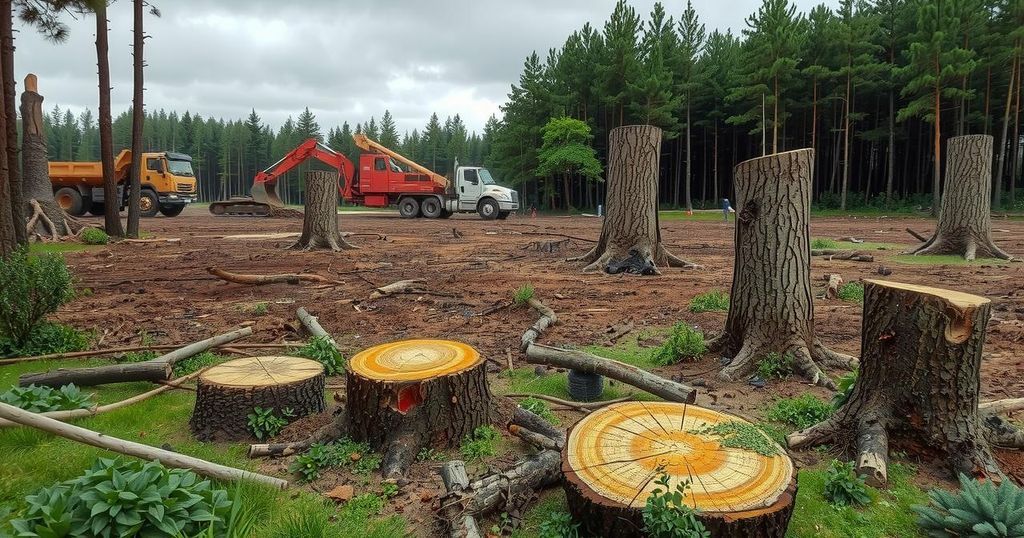A new highway is being built through the Amazon rainforest for the COP30 climate summit in Belém, Brazil, sparking outrage over environmental concerns. The project threatens local livelihoods and wildlife, contradicting the summit’s aim of addressing climate change. Brazilian officials tout the highway’s sustainable features, but local communities and conservationists fear long-term ecological damage and seek greater representation in the discussions surrounding the summit.
A new four-lane highway is being constructed through protected areas of the Amazon rainforest in Brazil for the upcoming COP30 climate summit in Belém. The highway is intended to facilitate traffic for the event, which is expected to attract over 50,000 attendees, including global leaders. However, this initiative has sparked significant concern among local communities and conservationists regarding its adverse environmental effects, particularly its contradiction to the summit’s environmental agenda.
The Amazon rainforest is critical for global carbon absorption and biodiversity, making the deforestation associated with this project particularly contentious. The highway stretches over 13 kilometers, with heavy machinery already clearing vast tracts of lush forest, which further threatens the delicate ecosystem that houses diverse wildlife. Local residents, such as Claudio Verequete, have expressed their distress over the loss of income sources, like açaí berry harvesting, and the lack of compensation provided by the government.
Communities living nearby worry that this infrastructure will encourage further deforestation as more businesses may encroach upon the area. Verequete articulates the fear of future developments, stating, “Our fear is that one day someone will come here and say: ‘Here’s some money. We need this area to build a gas station, or to build a warehouse.'” He emphasizes that those residing close to the highway will benefit little from it, as it will not provide quicker access to essential services in Belém.
Prof. Silvia Sardinha, a wildlife veterinarian, points out that the highway will disrupt the movement of wildlife and the rehabilitation efforts for injured animals. She notes the ongoing loss of natural habitats, stating, “From the moment of deforestation, there is a loss,” which will significantly limit the wildlife’s ability to thrive.
Brazilian officials argue that the COP30 summit represents a pivotal opportunity to address the needs of the Amazon while showcasing conservation efforts. However, Prof. Sardinha critiques this narrative, claiming that local voices are not adequately represented in high-level discussions about their environment.
The highway, named Avenida Liberdade, had previously been delayed due to environmental concerns but is now part of a broader agenda of infrastructure projects aimed at modernizing Belém for the summit. Officials describe it as a sustainable initiative that includes wildlife crossings and other features to mitigate its impact on nature. The Brazilian federal government has committed substantial funds to expand local infrastructure, including the airport and a new city park designed for public use after the summit.
While some market vendors in Belém see potential economic benefits from the construction and influx of visitors for the summit, others remain cautiously optimistic. Business owner Dalci Cardoso da Silva acknowledges the improvements while lamenting the past neglect of the city. He states, “The city as a whole is being improved, it is being repaired…” Another vendor, João Alexandre Trindade da Silva, emphasizes the importance of concrete actions following the summit discussions to foster a healthier environment for future generations.
As preparations for the COP30 summit continue, there is growing scrutiny regarding the environmental implications of such large-scale events and whether the measures undertaken to facilitate them truly align with the objectives of addressing climate change.
In conclusion, the construction of a highway through the Amazon rainforest for the COP30 climate summit raises significant environmental concerns, directly contradicting the aims of the event. Local communities are adversely affected, facing losing their livelihood without compensation. Additionally, the potential ecological repercussions, including wildlife disruption and deforestation, pose critical challenges to conservation efforts. Despite the promises of modernization and economic development, the need for genuine action and local representation remains imperative to align with the goals of climate action.
Original Source: www.bbc.com




